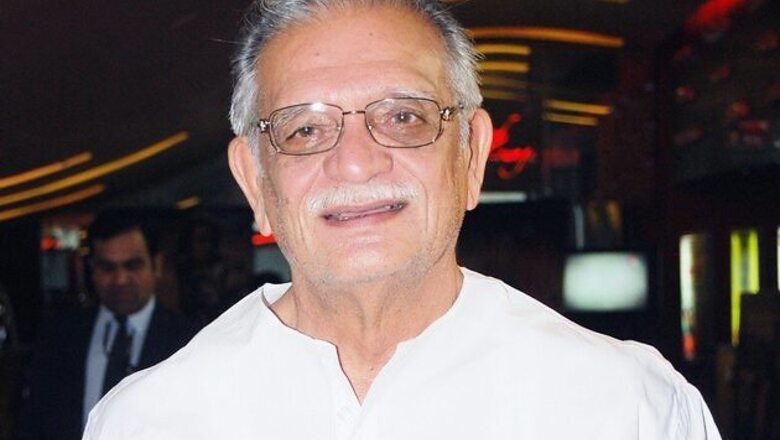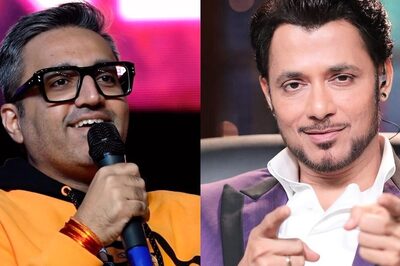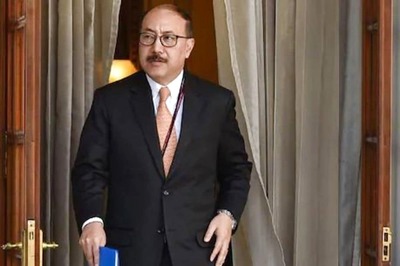
views
New Delhi: From helming songs for Bimal Roy's film 'Bandini' to penning the Grammy-winning song 'Jai Ho,' poet-lyricist Gulzar says the seemingly effortless transition was made possible by director-composer Vishal Bhardwaj.
The 80-year-old expresses his gratitude to Bhardwaj for helping him traverse the changes of generations and had been a major support at a time he felt "tired" and "old" of walking during the downhill of life.
Gulzar was speaking last evening at the culmination of 'Spring Fever' by Penguin, a celebration of books and literature that began here on March 14. "Vishal belongs to this generation and I get to know the nuances of the current age by being in constant touch with him," he said adding that had it not been for Bhardwaj, he was
afraid he would be like 'Ek akela iss sheher mein', words he took from one of his famous songs.
With Gulzar's experience and flair fusing with Bhardwaj's contemporary experimentation, the compositions by the duo have certainly been among the finest in Bollywood.
'Chodh Aaye Hum' from "Maachis', which was their first collaboration and 'Dil toh Baccha hai ji' from 'Ishqyiya' among others stand witness to the beauty that the duo created
together.
Charting down the challenges he had to cope with altering
times, the 2013 Dada Saheb Phalke awardee took a dive into
yesteryear cinema when songs were shot with images and as a
montage.
"Cinema has become more sleek and its pace has also gone
up," he said adding that now, with the songs playing in the
background, "we have a montage of the montage."
Admitting that a lyricist's job had become significantly
challenging today, for now, Gulzar said, they have to write
not only for the leading pair, but also for several side
characters, thereby widening their purview of writing.
"Goli maar bheje mein, ye bheja shor karta hai" from the
1998 film "Satya", for instance, was lip-synced by a side
character.
"In writing such songs the languages used by the
characters, their antics and situations are to be understood"
Gulzar said.
Confessing a greater fondness for the present day, than
for his own time, he asserted that the growing professionalism
among the contemporary artists manifests their commitment
towards their job and hailed it as the progress of the music
industry.
"The actors are very committed. Whether they grow or don't
grow a beard, or how much weight they put on, is all according
to the role that they are shooting for. I like this period,"
he said.
With a career spanning over five decades, Gulzar said he
had never first created lyrics or 'nazm' and then stretched
into a story or had characters created from it.
"I have never worked on a film without having the entire
script. I first go through the script and even weigh the
options of using a song in the film depending on the script.
If a song can be included without breaking the flow of the
story only then do we do it.
"Like the song - 'Mera kuch saamaan' - such a song could
only be a part of the script," he said as he candidly recalled
the famous anecdote with late composer R D Burman and Asha
Bhosle that was associated with creation of this song from the
1987 film "Ijaazat".
Gulzar also participated in the preview session of a new
book "Another 100 Lyrics" - a translation of some of his works
by writer Sunjoy Shekhar.
The veteran poet pointed out that poetry made for a more
personal statement than a film lyric and maintained that both
the styles were quite different from each other on account of
the restrictions they imposed.
"Poetry is easier than film songs because you do it at
your own will, whereas in songs you work under restrictions,"
Gulzar said.
"...but if you are clever, a little smart and dishonest
like myself then you put your own statements in between the
lyrics and get away," the Padma awardee quipped recalling the
late lyricist Shailendra as the master in this craft.
The octogenarian's first lyrics came in Bimal Roy-helmed
"Bandini" (1963) and the latest in "Kill Dil" (2014).
"People have changed with time. They now use SMS, phone
calls and the Internet to communicate. Nobody writes letters
anymore. So the writer also needs to change his style in sync
with time to stay relevant," he said.




















Comments
0 comment